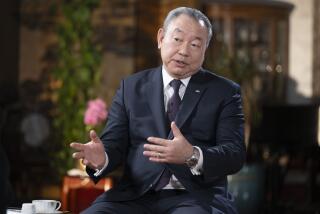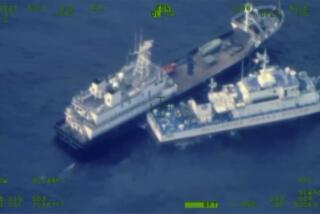U.S. Reaffirms Support of Aquino Government : Beset by Challenges From Defense Minister, Philippines’ Leader Gets Ambassador’s Pledge
- Share via
MANILA — U.S. Ambassador Stephen W. Bosworth made it clear Thursday that the United States stands firmly behind Philippine President Corazon Aquino in her dispute with Defense Minister Juan Ponce Enrile over how to handle the country’s Communist insurgency.
“There is no ambiguity in the U.S. position,” Bosworth said in a speech here. “We support the government of President Corazon Aquino firmly, totally and unequivocally.”
On Wednesday, after Aquino apparently put an end to a political crisis brought on by Enrile’s repeated challenge to her policies, she met privately for more than an hour with Bosworth, whom she described as an “extremely close friend.” And on Thursday, Bosworth said that his government’s support for Aquino remains unshaken.
Question on Alternatives
Bosworth was asked whether the Reagan Administration would be equally supportive of a government headed by Defense Minister Enrile, or by Vice President Salvador Laurel, both of whom have been critical of Aquino.
“I shouldn’t touch that with a 10-foot pole,” Bosworth replied, then added: “Let me just say--and I’ll say it until I’m blue in the face--the United States government supports the government of President Corazon Aquino completely and unequivocally.”
The message was clear: Despite lingering political and economic instability and a continuing threat from Enrile and some army officers, the Reagan Administration feels more comfortable with the Aquino government than it would with Enrile or Laurel, both of whom are believed to harbor presidential ambitions.
It is not simply because Aquino, who spent eight years in the United States, is a product of the American culture. At the heart of Washington’s backing for her is Aquino’s eight-day official visit to the United States last month, in the course of which she won key support in the Congress, the State Department and the White House.
Aquino won a standing ovation from a joint session of Congress. President Reagan lauded her efforts to deal with the insurgency and admired her for her personal integrity. Secretary of State George P. Shultz said he is one of “Cory Aquino’s biggest fans.”
In his speech Thursday, Bosworth told members of the Manila Polo Club that he hopes Aquino’s visit to the United States “once and for all laid to rest the nagging suspicions and questions which I occasionally encounter as to whether or not America supports this new government.”
A member of Aquino’s Cabinet, who accompanied her to the United States, put it much more strongly: “What she managed to do is come back from the United States wrapped in the American flag, and that stripped Enrile naked.”
Since the visit, Enrile, an open supporter of the U.S. bases in the Philippines and an advocate of a hard-line approach to the Communist insurgency, has sounded a distinctly anti-American note.
He has said he is pushing for military pressure on the insurgents in addition to Aquino’s cease-fire talks because he wants to reduce the Philippines’ longstanding dependence on the United States, which ruled here for half a century as a colonial power.
Wary of Foreign Influence
Enrile said that if the insurgency continues to grow, “we will have to look to friends outside our national domain for assistance.”
“The more we depend on our foreign friends,” he said, “the more influence they will exert on our national life. . . . We would give them the avenue to influence us over the course of our national life and our future. That is what we want to avoid. At that point in time, to us it will be a matter of survival; to them it will be simply a matter of foreign policy.”
Enrile took a similarly nationalistic line on a weekend trip to the central city of Cebu, where he lined up considerable military and civilian support for a possible break with Aquino.
In private meetings with businessmen and political leaders, according to sources who were present, Enrile complained about the influence Washington already has in Philippine affairs.
At one point, these sources said, Enrile angrily recalled that the U.S. Embassy here had refused to provide gasoline for his group’s helicopters during the coup that overthrew President Ferdinand E. Marcos last February. Enrile said it was he, not the Americans, who persuaded Marcos to leave for exile in Hawaii.
Asked about his feelings toward Washington in this week’s crisis in the ruling coalition, Enrile replied, “I have too many enemies already without creating a bigger enemy.”
Aware of U.S. Importance
Aquino and her Cabinet are fully aware of the continuing importance of the U.S. role in the Philippines 40 years after this country gained full independence.
“A coup in this country can only succeed if it is supported by the Americans,” Aquilino Pimentel, the minister of local governments, said Tuesday at the height of the crisis. “The entire military establishment is dependent for its weapons, its spare parts and even its attitude on the Americans.”
Asked whether he thinks Washington would ever support a coup against Aquino, Pimentel said: “I don’t think so. On the contrary, the Americans are entirely supportive of the government of Mrs. Aquino.”
Others were not so certain. A member of Enrile’s security group speculated that if the defense minister managed to enlist enough support among the regional military commanders, the Americans would probably “take a wait-and-see attitude until it was clear just who had more generals.”
Role of U.S. Bases
“The Americans are pragmatists,” he said, “and they know Minister Enrile would protect their bases.”
A Western military officer, asked which leader America would support if a coup had taken place, said, “It could go either way.”
Throughout the weeklong drama, which appeared to have been resolved, at least temporarily, at midnight Tuesday after Aquino met with Enrile and other leaders of the coalition, Washington and the U.S. Embassy in Manila were noticeably silent. And since then, top analysts at the embassy have treated it almost as if it had not happened.
An official at the presidential palace said: “The Americans are being cautious. They have to be. They have at stake their two largest bases outside the United States. But make no mistake. Ever since the president returned from America, it’s clear that it would take heaven and earth to shake their support and confidence in her. Enrile himself is only playing that anti-American game because he knows he lost the pro-American one.”
Clearly, the Reagan Administration gained by doing nothing during the crisis.
Without a single word from Washington, which is known to want a tougher anti-Communist policy from Aquino, the Philippine president announced after her meeting with Enrile that the government’s hand of peace would “soon be clenched in a declaration of war.”
Bosworth himself took note of this in his speech Thursday, saying, “We are confident that the Filipino people and the Philippine government are coming to grips with a satisfactory program for dealing with that insurgency.”
More to Read
Sign up for Essential California
The most important California stories and recommendations in your inbox every morning.
You may occasionally receive promotional content from the Los Angeles Times.










